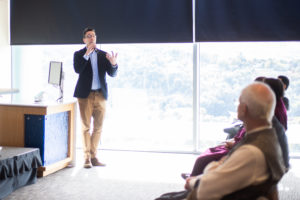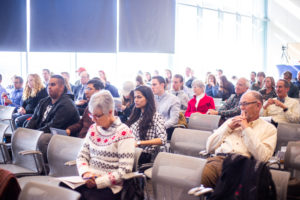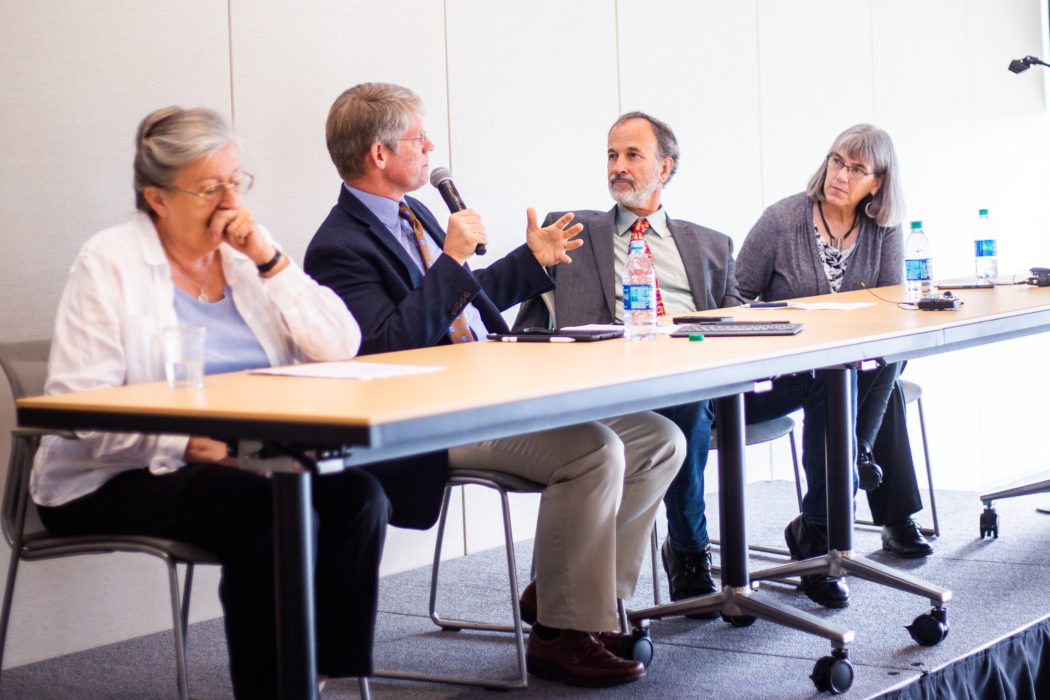‘God and Smog’ symposium connects religion and the environment
Scholars and religious leaders throughout the country gathered at Utah State University to weigh in on the responsibility and relationship of religion to the environment during the first “God and Smog” conference held Wednesday.
The first panel of the conference centered around specific practices and issues regarding the environment within religion. The second panel was made up of religious leaders who discussed both their religions’ and their personal relationships with the environment. Both panels focused on Buddhism, Hinduism and strains of Protestant Christianity, including The Church of Jesus Christ of Latter-day Saints.
Ravi Gupta, the head of the religious studies program at USU, recognized the limited diversity of religion in the panels and expressed hope for expanded representation in future projects.

Utah State University hosts a day-long symposium called God and Smog on October 10, 2018, in the Huntsman building on Utah State’s campus. The symposium considers the environment in relation to the perspectives and actions of four relgious traditions: Hinduism, Buddhism, traditional Christianity and Mormonism. (Megan Nielsen)
“In this particular conference, just because of limitations in time and space, we weren’t able to cover all major religious traditions of the world,” he said. “We’d like to do this again with Judaism, Islam, with other branches of Christianity — such as Catholicism — to really broaden the conversation.”
Between the groups, themes emerged of preserving the planet for future generations and the failures of many religious organizations to encourage the environmentalist undercurrents of its faiths.
Margaret Barker, the former president of the Society for Old Testament Study, argued for a reinterpretation of the Bible, correcting past mistranslations that see Earth as a temple that should be protected by humanity. Under this interpretation, Barker said, a passage in Revelations referring to “the destroying of the destroyers of the Earth” could potentially refer to anyone who failed to uphold that protection.
Rev. Susan Springer of the Episcopal Church recognized internal failings to address climate change in Christianity.
“Both the misinterpretation of scripture and the hubris of man have gotten in the way of properly taking care of [God’s] creation,” Springer said.
Gupta said the symposium has been in the planning stages since at least 2013.
“We live in the most religious state in the nation, and so it seems to us very obvious that if our natural ecology is something that we are concerned about, globally and locally, we have to get religious actors involved in it,” Gupta said.
On Oct. 1, the U.N. Climate Council released a study stating that the world has 10 years before the damage from climate change would reach catastrophic levels.

Utah State University hosts a day-long symposium called God and Smog on October 10, 2018, in the Huntsman building on Utah State’s campus. The symposium considers the environment in relation to the perspectives and actions of four relgious traditions: Hinduism, Buddhism, traditional Christianity and Mormonism. (Megan Nielsen)
Rev. Springer emphasized that high political tensions in the United States leave religious leaders under pressure to address issues carefully.
“Some people are angry that we’re not political enough,” she said. “Some people are angry that we’re too political.”
A 2015 Pew Research study found that less than half of religious Americans believed in human-caused climate change.
George Handley, the associate dean of Brigham Young University’s College of Humanities, argued for new approaches to belief, advocating for dynamic doctrine and a proactive membership that can adjust to address new problems like climate change.
“Climate change is a challenge, but also a call for religious people to dust off our own theology,” Handley said. “If it’s too much about what the church is or isn’t saying, it feels like to me we’re trying to lobby the church to say or do things that we really ought to be saying to each other.”
When asked about the LDS Church’s plans to address climate change, Elder Steven Snow, a member of the Quorum of the Seventy and executive director of the Church History Department, offered hope for the future.
“I think when it comes to environmental stewardship, we could do better,” Snow said. “There’s a growing awareness, but apart from that, I couldn’t comment. It’s not something you tout from the pulpit.”
Gupta, who organized the conference, said he hopes the God and Smog symposium will be the first of many events on religion and the environment, and that the initiative will expand to other colleges at USU.
“People in different parts of campus — like politics, business, economics and natural resources — are also invested in these sorts of questions, and are natural partners in dialogue,” he said. “This is not the last word. This is just the beginning.”
mwcrabtr@gmail.com
@bread_dish

